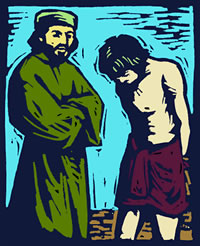
24th Sunday in Ordinary Time Year A
During this time of pilgrimage, sinfulness in the life of the Church obscures the reality of our life in Christ – a common life that should be a sign of hope for struggling humanity. It is not without reason that we begin the Church’s most solemn liturgies with an acknowledgement of our sinfulness. It should not surprise us, therefore, that the passage of Matthew’s gospel from which we are reading - concerning our life in the Church - is in large part about problems associated with the sinfulness of members of the Church. Last Sunday’s reading discussed the reconciliation of members guilty of public crimes destructive of the community. Today’s reading concerns the forgiveness called for within the community at a personal level.
As was so often the case, Peter’s impulsiveness gives rise to an important lesson. Peter has received a commission that involves considerable power in the life of the community of disciples. He thinks he is expressing what Jesus expects of him in the exercise of his authority. The question he puts to Jesus implies that he will be ready to forgive ‘seven times’. His round number really hints at an indefinite readiness to forgive. Apparently, the scribes of the day taught that one was not obliged to forgive after the third or fourth time. But the response of Jesus declares that this vagueness is not enough: ‘Not seven, but seventy seven times’ - there should be no limit to our readiness to forgive! Perhaps, as we hear this gospel, we are tempted to think that it has little to do with us - because we have never faced up to the ill will and resentments we have towards other members of our community, and to the gossiping and factions these attitudes give rise to. Though these attitudes may not seem seriously sinful, they can be very damaging, making it impossible for our parishes to live the kind of life that leads others to share in our faith. Resentment and the vengeful spirit have been part of the human story since the beginning. Living in covenant with living God, and learning God’s ways, old Israel came to accept that vengeance must be left to the Lord. For peoples who did not know the covenant, there was no limit to the spirit of revenge. In fact, the response of Jesus reminds us of this spirit, as expressed in book of Genesis, where Lamech boasts that he will exact ‘vengeance seventy-seven fold’ (Gen 4:24). Jesus is reminding us of his teaching in the Sermon on the Mount. In Matthew’s text, Jesus is remembered as teaching, ‘Be perfect as your heavenly Father is perfect’ (Mt 5:48). Because the meaning of the word, ‘perfect’, in the biblical tradition has not been properly understood, one contemporary Bible renders this verse, ‘Set no bounds to your love, just as your heavenly Father sets none to his’. The parable of the unforgiving manager drives home this lesson. Clearly, the ruler’s generosity brings to mind the generosity of God. The debt forgiven was a fantastic amount, defying the imagination of Jesus’ audience, impossible to repay. We are invited to compare our unforgiving spirit with the boundless generosity of our God.
Let us examine our attitudes to others in our worshipping community. Have we failed to face up to our antagonisms, and tended to justify them by being judgmental of the attitudes of our fellow Christians? The great Church Father, John Chrysostom, has good advice for us as we examine our conscience. If we are not aware of our destructive attitudes we shall never grow up spiritually. On the other hand, he tells us, awareness of our own failings helps us to find the wisdom, gentleness and compassion that should be ours as true followers of the Saviour.
John Thornhill sm

